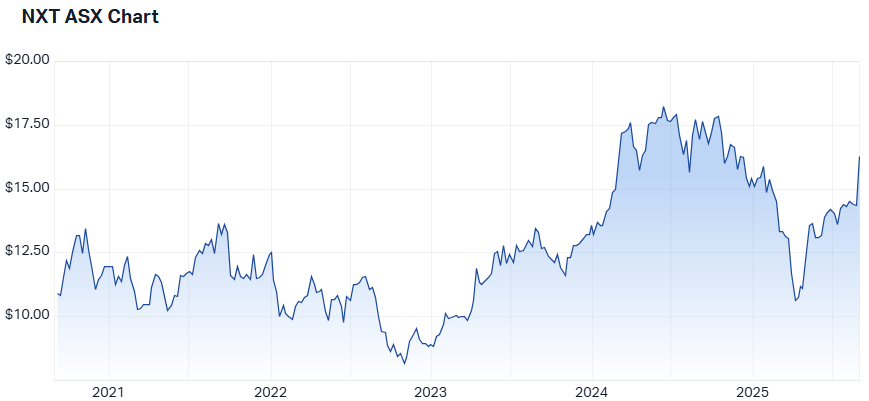NEXTDC’s costly year, but a runway for AI demand
Over the past decade, NEXTDC (ASX: NXT) has been one of the ASX's standout performers, delivering a total return of 585.42% over 10 years and 38.35% over the past five. That track record has been built on the company's role as both builder and beneficiary of Australia's digital economy infrastructure boom.
FY25 marked another year of expansion, with the company delivering revenue of $427.2 million (up 6%), underlying EBITDA of $216.7 million (up 6% and within guidance), and NPAT of $60.5 million.
While capital expenditure came in above expectations at $1.7 billion, the company also set new records with 72.2MW of contracted sales and a forward order book of 134MW - more than its entire current billing footprint.
NEXTDC Chief Executive Officer and Managing Director, Craig Scroggie, commented on the FY25 results:
“FY25 exceeded net revenue guidance and set new contracting records. Our Forward Order Book is greater than the entire billing footprint today, and with a strong liquidity position we are rapidly bringing capacity forward to turn contracted commitments into revenue and cash flow while scaling for extraordinary AI and cloud demand across Asia-Pacific.”
For investors, the results read as solid but not spectacular - a mix of steady operational delivery, some soft spots on the bottom line, and outsized capital outlay. Yet the real story lies in the years ahead.
Billing utilisation is ramping faster than expected, with Citi estimating FY26 at ~168MW versus consensus 127MW (+32%) and FY27 at ~226MW versus 180MW (+26%). That trajectory implies at least a 10% EBITDA upgrade, while new JV structures and debt funding should alleviate equity raise concerns.

With guidance for FY26 pointing to EBITDA of $230-240 million and capex set to rise again to $1.8-2.0 billion, the market's focus will be on how quickly contracted capacity converts into revenue, and how effectively joint venture partnerships can ease capital intensity.
In a market where AI and cloud are driving insatiable demand, NEXTDC is positioning itself as a critical enabler of that growth.
For further insight on NXT's results, I spoke to Hailey Kim of Wilson Asset Management to talk about results, her view on valuation and whether she rates the stock as a buy, hold or sell.
NEXTDC (ASX: NXT) FY25 results
- Total revenue up 6% to $427.2m vs. $430.0m est (0.7% miss)
- Underlying EBITDA up 6% to $216.7m vs. $215.0m est (0.8% beat and within guidance $210–220m)
- NPAT $60.5m vs. $63.4m est (4.6% miss)
- Capital expenditure $1.70bn vs. FY25 guidance $1.40–1.60bn (13% miss)

What was the key takeaway from NEXTDC's results in one sentence?
NXT delivered solid results and guidance broadly in line with expectations. More importantly, the company outlined the forward billing ramp timeline, implying material upside to near-term earnings and a shift towards a more capital-efficient model through joint venture partnerships.
Were there any surprises in this result that you think investors need to be aware of?
NXT provided details on the conversion timeline of the forward order book for the first time, implying billing utilisation will double by the end of FY27, and operating leverage is expected to accelerate as contracted capacity converts to billing.
The company also announced plans to establish a joint venture for the development of S4 and S7 in Western Sydney and TK1 in Tokyo, derisking the near-term need for an equity raise.
Would you buy, hold or sell NEXTDC off the back of this result?
RATING: BUY
Data centre fundamentals remain strong in Australia and globally, and NXT provides direct exposure to the theme underpinned by record contract wins, improving operating leverage and strategic JV execution.
Are there any risks investors need to be aware of?
The broader backdrop of elevated global tech valuations remains a key risk in the near term. A pullback in sentiment or multiples in the sector could weigh on NXT’s valuations even if fundamentals remain intact, as seen earlier this year with Chinese AI startup DeepSeek.
From 1 to 5, where 1 is cheap and 5 is expensive, how much value are you seeing on the ASX today?
RATING: 4
On balance, 4. Valuations look stretched in parts of the market, particularly banks and a few crowded names, but dislocations are also creating opportunities in stocks oversold on sentiment where fundamentals remain compelling.
5 topics
1 stock mentioned
1 contributor mentioned


